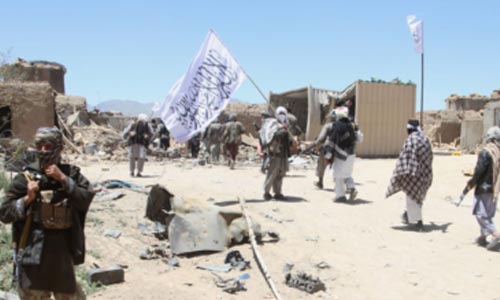Following the coordinated attacks of Taliban on Hazara regions, especially Jaghori inflicted severe damages on the lives of already deprived people. According to local sources, nearly 3000 families has been displaced, many houses were burnt or destroyed, telephone networks and other public services such as schools, universities, businesses and so on have all stopped. As a result, thousands of men, women, and children became homeless and are extremely at risk of freezing weather and hunger in Ghazni, Bamyan and other neighboring provinces. The exact number of causalities is not accurate but the basic figure as given by local sources show that 42 people were killed, 5 people are missing, and 48 people have been wounded while over than 30 killed and injured from the security forces.
The attacks on Jaghori and Malistan comes after tragic battle between Taliban fighters and Hazara local police in the central province of Uruzgan Khas that reportedly killed one hundred people and around 500 families displaced to neighboring districts. Due to late action by security forces and vastness of tragedy it caused a lot doubts and mistrust that eventually, a large number of people walked out to raise their voice through peaceful demonstration from Kabul, Bamyan, and Mazare Sharif. The street protest in Kabul ended with ISI attack that left 6 killed, and 20 wounded.
Thus, the hatreds spread throughout the country and even penetrated to the academic environments; a number of Kabul university students started clashes with each other over similar ethnic issues on Thursday, in which several of them were killed and injured. Arresting around 35 students, the government promised to punish those involved in the university tensions, with the minister of higher education saying that no individual or group was allowed to expand political and group plots in the academic campuses. As a result, The Kabul University was closed until an unknown date due to tensions among students, ministry of higher education said Friday.
The widespread violence also instigated the parliament to summon the security officials for briefing about the increasing violence. Facing the harsh criticism, the defense minister burst out to confess the limitedness of the government capacities and asking for cooperation of PMs.
In recent years, such attacks are increasingly repeated on Hazara community. Taliban and IS have been accused of committing human rights violations against certain group of people. In the capital, Kabul, Hazaras have suffered repeated violence. Hundreds have died in the attacks, which have targeted Hazara protests, Shi’ite mosques, and shrines. IS has invariably claimed such attacks to create sectarian division in the country.
However, The Taliban denied targeting “any specific race, ethnicity or sect,” in a statement posted on their website. The attacks were against the “Kabul regime and American hireling positions in Jaghori”, spokesman Zabiullah Mujahid said. He stressed our fight is not against any religion or any race and Hazara our compatriot they should not leave their homes. He said, they would firmly deal those who frightened to leave their homes. This is said after, many expressed concerns and displacement about the apparent deliberate targeting of Hazaras.
The government is also responsible to a large number of displaced men, women, and children who are in need of urgent assistance; Arrivals to Ghazni city, where Taliban fighters are clashing with government forces on the outskirts of town, say the government has failed to provide them with basic necessities. “We have gone from one grave to another,” says Abdullah, a resident of Jaghori who fled to Ghazni city on November 13 with his family of nine. “We don’t have any food or blankets. Two of my children are sick from the cold, and there’s no medicine.” “We left in the middle of the night in a crowded truck,” adds Abdullah, who only goes by one name. “People left the city by any ways they could. Most families are living in schools, mosques, and hostels in the city, while others are staying with relatives. Many of the new arrivals say the response has been slow. “I came here with my wife and children,” says Mohammad Ali, whose family found shelter in a mosque in Ghazni city on November 11 after leaving their home in Sang-e Masha, the main town in Jaghori district. “There’s no food. People are getting sick.”
Home » Opinion » The Consequences of Taliban Attacks on Hazara Region
The Consequences of Taliban Attacks on Hazara Region
| Mohammad Zahir Akbari

